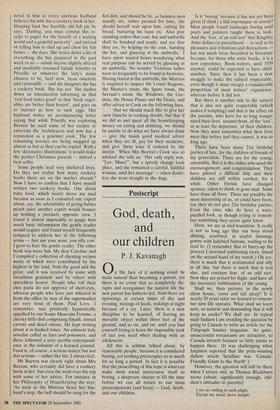Postscript
God, death, and our children
P. J. Kavanagh
0 n the face of it nothing could be more natural than becoming a parent, yet there is no event that so completely dis- rupts and reorganises the natural life the new parent has hitherto led. Now there are tiptoeings at certain times of day and evening, mixings of feeds, wakings at night because of a cry. Later, there is a new discipline to be learned, of leaving no movable object within three feet of the ground, and so on, and on, until you find yourself trying to learn the impossible trick of tact you need when dealing with an adolescent.
All this is seldom talked about, by reasonable people, because it is considered boring, yet nothing preoccupies us so much for so long a period. In fact it is possible that the proscribing of this topic is what can make most social intercourse itself so boring, a desperate chatter to fill the time before we can all return to our main preoccupations (and fears) — God, death, and our children.
Is it 'boring' because it has not yet been given (I think) a full imprimatur in novels? Most people found landscape boring until poets and painters taught them to look. And the 'fear, of an odd sort' that Kingsley Amis defines in parenthood — as well as its pleasures and irritations and distractions has not much been described in literature because, for those who write books, it is a new experience. Book-writers, until 1939 anyway, could be expected to have child- minders. Since then it has been a slow struggle to make the subject respectable, even though it must occupy a considerable proportion of most writers' experience, whereas before it did not.
But there is another side to the subject that is also not quite respectable (which makes it tempting) and that is the effect on the parents, who have for so long reorga- nised their lives around them, of the 'loss', or at least the departure, of their children. Now they must remember what their lives were like before and they cannot, it was so long ago.
There have been many 21st birthday parties of late, for the children of friends of my generation. These are for the young, ostensibly. But it is the oldies who need the encouragement, and congratulation. They have piloted a difficult ship and their children are still within earshot, for a while. Other friends have changed spouses, taken to drink or gone mad. Some have done all three. These are possibly the most interesting of us, or could have been, but they do not give 21st birthday parties; Even the ones who do have a wary, puzzled look, as though trying to remem- ber something they never quite knew.
Here, we are in mid-transition. It really is not so long ago that our boys stood shining, scrubbed, in scarlet dressing- gowns with ladybird buttons, waiting to be read to. (I remember that to hurry-up the process I invented undressing races, timed on the second-hand of my watch.) Oh yes, there is much that is sentimental and silly in all this, but there is much that is real also, and contains fear, of an odd sort. Now they are poised for flight, and have all the necessary ruthlessness of the young.
Shall we, their parents, in the newly silent house, yawn and fall aleep? It is nearly 20 years since we learned to remem- ber new life upstairs. What shall we learn now, so natural and demanding that it will keep us awake? We shall see. In typical male fashion I am avoiding the question by going to Canada to write an article for the Telegraph Sunday magazine. As quiet, unsuccessful restaurants are attractive, so Canada attracts because so little seems to happen there. (It was challenging when Jaspistos reported that the prize-winning dullest article headline was 'Canada: Friendly Giant to the North'.)
However, the question will still be there when I return and, as Thomas Blackburn wrote (about, significantly enough, chil- dren's attitudes to parents): I see no ending to such plight Except my usual; more insight.














































 Previous page
Previous page